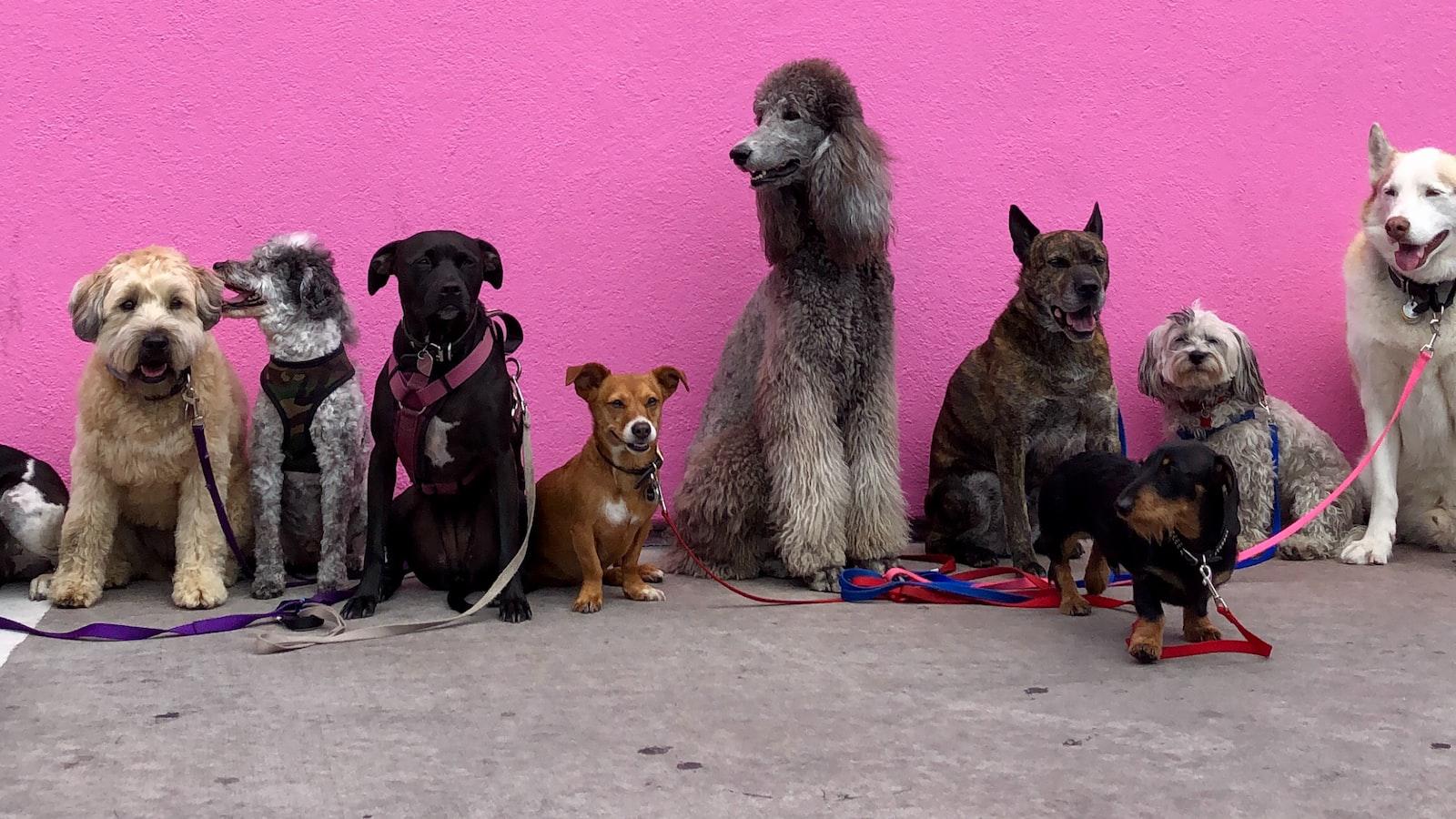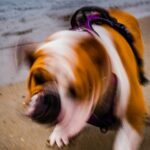Have you ever noticed how our furry companions, who once dashed around the park with boundless energy, slowly start to lose weight as they grow older?
It’s an all-too-common phenomenon that many pet owners find both puzzling and concerning.
This article will answer the question: Why do dogs get skinnier when they age?
Why do Dogs Lose Weight as They Age?
As our furry friends grow older, we may start noticing a change in their weight.
Many dog owners have wondered, “Why do dogs get skinnier when they age?”
Well, the answer lies in a combination of factors that affect their metabolism, activity levels, and overall health:
Slowing Metabolism
Just like humans, dogs experience a natural slowing down of their metabolism as they age.
This means that their body may not be able to process food as efficiently as before, leading to weight loss.
Additionally, older dogs may have a decreased appetite, which can further contribute to their weight reduction.
It’s important to consult with a veterinarian to ensure the weight loss is not due to an underlying health issue.
Dental Problems
Your dog’s dental health plays a significant role in their ability to eat and digest food properly.
As dogs age, they may develop dental issues such as tooth decay and gum disease, making it painful for them to eat.
This discomfort often results in a decreased appetite and subsequent weight loss.
Regular dental check-ups and implementing a dental care routine can help alleviate these problems and maintain your dog’s overall health.
Chronic Conditions
Just like humans, dogs can develop various chronic conditions as they age, including kidney disease, diabetes, and thyroid problems.
These conditions can affect their metabolism, leading to weight loss.
If you notice your aging dog losing weight rapidly or exhibiting other concerning symptoms, it’s crucial to seek veterinary attention.
A proper diagnosis and management plan can help ensure your dog’s well-being and prevent further weight loss.
Nutritional Recommendations for Seniors to Prevent Weight Loss
To help your senior dog maintain a healthy weight and prevent excessive weight loss, it’s crucial to make some adjustments to their diet.
Providing a balanced and nutritious diet is key.
Opt for high-quality dog food that is specifically designed for seniors.
These formulas often contain the right balance of nutrients, including protein, to support muscle health and prevent muscle wasting.
Make sure the food you choose has easily digestible proteins to ensure that your furry friend can absorb the necessary nutrients effectively.
In addition to a suitable diet, it is crucial to keep an eye on your senior dog’s eating habits.
Aging can sometimes lead to a decrease in appetite, so it’s important to monitor their food intake and observe any changes.
If you notice a significant decline in their appetite or rapid weight loss, it’s advisable to consult your veterinarian.
They can perform a thorough examination to rule out any potential underlying health issues and provide appropriate recommendations tailored to your dog’s needs.
Exercise tips for maintaining a healthy weight in older dogs
Regular exercise is also essential to help maintain a healthy weight in older dogs.
However, it’s important to keep in mind that their exercise needs may differ from when they were younger. Here are a few exercise tips to consider:
Shorter, more frequent walks: Rather than long, strenuous walks, opt for shorter, more frequent outings.
This will allow your older dog to get exercise without overexerting themselves.
Low-impact exercises: Consider incorporating low-impact exercises into your dog’s routine, such as swimming or gentle obedience training.
These activities are easier on their joints and can help promote muscle tone.
Mental stimulation: Engaging your older dog’s mind is just as important as physical exercise.
Try interactive toys or puzzle feeders to provide mental stimulation and keep their brain active.
Remember, every dog is unique, and weight loss in older dogs can be caused by various factors.
If you’re concerned about your four-legged companion’s weight, it’s always wise to consult with a veterinarian for a comprehensive evaluation.
With proper care and attention, you can help your aging dog maintain a healthy weight and enjoy their golden years to the fullest.
Keep an eye on their diet, exercise, and overall well-being to keep that tail wagging for years to come!
FAQ
Q: What are some typical reasons behind this weight loss in senior dogs?
A: Well, there are a few reasons for this, my friend.
One possible cause is age-related muscle loss.
Just like humans, dogs may lose muscle mass as they age, which can make them look a little less chunky and more on the lean side.
Additionally, their metabolism may slow down, meaning they might burn fewer calories than before.
Q: Should I be concerned if my old dog is getting skinny?
A: It’s always essential to keep an eye on your pet’s weight, but don’t panic just yet.
While some weight loss in senior dogs is normal, excessive or sudden weight loss could indicate a health issue that needs attention.
Be sure to consult your veterinarian if you’re concerned.
Q: Can dental problems contribute to weight loss in older dogs?
A: Absolutely!
Dental issues can play a significant role in weight loss among senior dogs.
As they age, dental problems like gum disease or tooth decay can make chewing uncomfortable or even painful.
Consequently, dogs may avoid eating or struggle with their regular solid diet, leading to weight loss.
Q: Besides dental issues, are there any other health conditions linked to weight loss in older dogs?
A: Definitely!
Various health conditions could play a part in why your dog is losing weight.
For instance, diseases such as kidney or liver disorders, infections, and certain cancers might affect their appetite, metabolism, or nutrient absorption.
So, it’s crucial to have your canine companion examined by a vet to rule out any underlying medical causes.
Q: Are there any steps I can take to help my senior dog maintain a healthy weight?
A: Absolutely!
A good starting point is adjusting their diet.
Consider switching to a high-quality senior dog food that meets their nutritional needs, and don’t forget to portion their meals appropriately.
Regular exercise, tailored to their abilities, is also important for maintaining muscle tone and a healthy weight.
Lastly, regular vet check-ups will help catch any potential issues early on and allow for timely intervention, if needed.
Q: Can specific breeds be more prone to this weight loss in old age?
A: It’s interesting you ask!
While weight loss can affect dogs of any breed, some breeds, like smaller toy breeds or large breeds prone to bone and joint issues, may be more susceptible to age-related weight loss.
Always remember, though, that every dog is unique, and individual factors can play into their overall health.
Q: So, in a nutshell, should I be worried if my old dog is getting skinny as they’re getting older?
A: As mentioned before, some weight loss is natural in older dogs.
However, if you notice your furry friend losing weight rapidly, experiencing a loss of appetite, or showing other concerning symptoms, don’t hesitate to reach out to your vet.
Our beloved canines rely on us to take care of them, and keeping an eye on their weight is just another way we can ensure their well-being as they age gracefully.
To Sum It Up
As dogs grow older, they’ll begin suffering from lower metabolism, dental issues and chronic diseases that can reduce their appetite and hinder the absorption of nutrients and thus, making it harder for them to maintain their weight.
But fear not, for knowledge is power!
Armed with this newfound understanding, we can now take proactive steps to ensure our aging canine friends enjoy their twilight years with vitality and proper nourishment.
Regular check-ups at the vet, a balanced diet tailored to their specific needs, and, of course, plenty of love and attention are all crucial elements to keep our faithful companions healthy and happy.
Remember, dear reader, our dogs are more than just pets; they are our family.
So, let us grow old gracefully alongside our four-legged friends, embracing each stage of life, and ensuring that their golden years are filled with the joy and contentment they so selflessly bestowed upon us.
For in the majesty of their unwavering companionship lies immeasurable happiness and the unparalleled bond we share with our furry companions.












